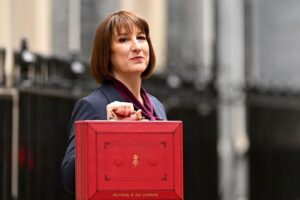
Chancellor Rachel Reeves unveiled during the Autumn Budget on Wednesday that pensioners are set to see a boost next year, with state pension payments increasing by 4.1% in April under the Triple Lock pledge.
This policy guarantees an annual rise in line with either average earnings growth, which stood at 4.1% from May to July, the Consumer Price Index (CPI) inflation rate, which was 1.7% in the year to September, or 2.5% – whichever is highest.
However, Ms Reeves did not mention the 453,000 “frozen” state pensions for British nationals living abroad, who will miss out on an increase of up to £470 in 2025/26. Many of these pensioners will go without this boost because they live in countries without a reciprocal pension agreement with the UK. Many have seen their state pension payments ‘frozen’ at the point of emigration.
Despite campaigning to encourage the UK Government to update their state pension to present-day rates and restore the triple lock, Chancellor Reeves only confirmed the forthcoming 4.1% increase to the contributory benefit.
This development comes after Pensions Minister Emma Reynolds remarked last week that the Department for Work and Pensions (DWP) is not negotiating any reciprocal social security agreements, reports the Daily Record.
The Chair of the End Frozen Pensions campaign, John Duguid, expressed disappointment with the Autumn Budget, noting: “This Budget does nothing to help the nearly half a million overseas UK state pensioners consistently denied all of the annual increases in the state pension, despite paying all their National Insurance dues.
“One such pensioner is soon to be 100-year-old World War Two veteran Anne Puckridge who is making the 4,400-mile journey from her home in Canada in December to lobby MPs and challenge the Prime Minister to a meeting.”
“Anne receives only half of the current value of the UK state pension. Many more of the half a million are much worse off. Given the lack of help on this issue in today’s Budget, we are hopeful that the Prime Minister will be even more inclined to do the right thing and agree to meet Anne.”
Pension rights have emerged as a hot topic following an MP’s query regarding the negotiation of uprating pensions for British expatriates. Anne Puckridge, a centenarian World War Two veteran, is rallying support through an online petition initiated by her daughter, demanding justice for those like herself who fail to receive yearly UK state pension increases while living abroad.
Despite having worked her entire life in the UK and made all her National Insurance Contributions, Ms Puckridge receives a mere £72.50 per week, less than half the £169.50 she would receive if she resided in the UK. This is the same amount she was entitled to in 2001 when she relocated to Canada at the age of 76 to be nearer to her daughter.
Like many others in her predicament, she was not informed that her state pension would be ‘frozen’ in this manner upon moving overseas. Under the earnings growth component of the triple lock (4.1%), individuals on the full new state pension will witness their payments increase by £9.10 per week from £221.20 to £230.30 next year, which equates to £921.20 every four weeks.
This will result in annual payments increasing by £473.60 from £11,502 to £11,975.60 over the 2025/26 financial year. Similarly, someone on the full basic state pension will see their weekly payments rise by £6.95 per week from £169.50 to £176.45, or £705.80 every four-week payment period.
Annual payments will increase for this group by £361.40 from £8,814 to £9,175.40 over the 2025/26 financial year.
The International Consortium of British Pensioners (ICBP) represents approximately 453,000 expats affected by ‘frozen pensions’ and is behind the ‘End Frozen Pensions’ campaign, which seeks to “end the injustice” for Britons who have moved abroad and whose state pension does not increase in line with the triple lock each April.
Many retirees residing in countries without a reciprocal agreement with the UK, such as Canada, Australia and New Zealand, have experienced a freeze on their state pension. This is despite having worked and lived in the UK for the majority of their lives and having paid their share of National Insurance Contributions, which would entitle them to state pension payments – if they hadn’t moved abroad.
To be eligible to claim the state pensions, people need at least 10 years’ worth of National Insurance Contributions and approximately 35 years for the full amount, although this may increase if they have been ‘contracted out’.
However, an analysis by the Canadian Alliance of British Pensioners suggests that all these frozen state pensions could be updated to match the current state pension pay rates by the new Labour Government for £50million. Its analysis found that state pension payments to frozen countries only account for 1.3 per cent of the UK Government’s total annual expenditure.
Over 100,000 British pensioners reside in Canada alone.


















